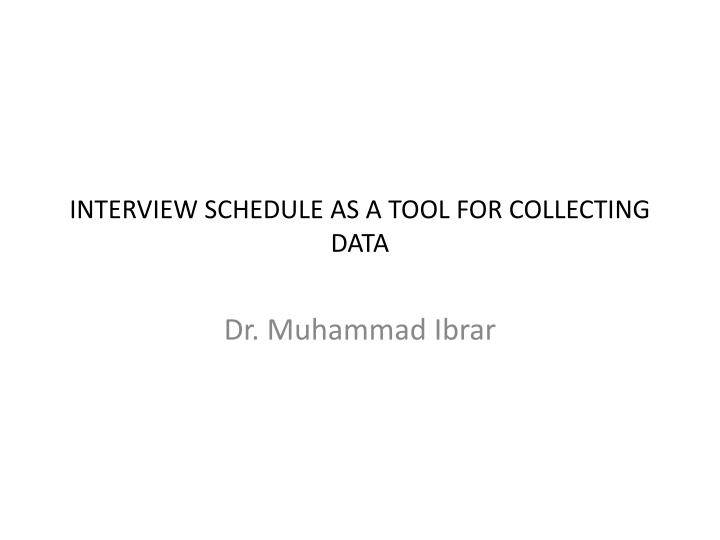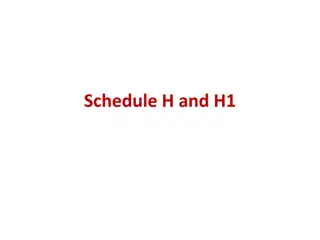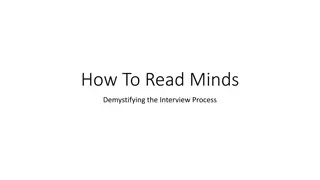Using Interview Schedule as a Data Collection Tool
Interview schedules are a method of data collection similar to questionnaires, where researchers or enumerators fill in a set of questions for respondents. The process involves researchers visiting respondents, asking questions in order, and recording responses. Enumerators must be carefully selected, trained, and possess qualities like intelligence, honesty, and patience. Interview schedules produce quick quantitative data with high reliability but low validity, making them a valuable tool in social research.
Download Presentation

Please find below an Image/Link to download the presentation.
The content on the website is provided AS IS for your information and personal use only. It may not be sold, licensed, or shared on other websites without obtaining consent from the author.If you encounter any issues during the download, it is possible that the publisher has removed the file from their server.
You are allowed to download the files provided on this website for personal or commercial use, subject to the condition that they are used lawfully. All files are the property of their respective owners.
The content on the website is provided AS IS for your information and personal use only. It may not be sold, licensed, or shared on other websites without obtaining consent from the author.
E N D
Presentation Transcript
INTERVIEW SCHEDULE AS A TOOL FOR COLLECTING DATA Dr. Muhammad Ibrar
Introduction This method of data collection is very much like the collection of data through questionnaire, with little difference which lies in the fact that schedules (proforma containing a set of questions) are being filled in by the researcher/enumerators who are specially appointed for the purpose. These researcher/enumerators along with schedules, go to respondents, put to them the questions from the proforma in the order the questions are listed and record the replies in the space meant for the same in the proforma.
Contd. In certain situations, schedules may be handed over to respondents and researcher/enumerators may help them in recording their answers to various questions in the said schedules. Researcher/enumerators explain the aims and objects of the investigation and also remove the difficulties which any respondent may feel in understanding the implications of a particular question or the definition or concept of difficult terms.
Contd. This enumerators for filling up schedules or assisting respondents to fill up schedules and as such enumerators should be very carefully selected. The enumerators should be trained to perform their job well and the nature and scope of the investigation should be explained to them thoroughly so that they may well understand the implications questions put in the schedule. method requires the selection of of different
Contd. Enumerators should be intelligent and must possess the capacity of cross-examination in order to find out the truth. Above all, they should be honest, sincere, hardworking and should have patience and perseverance.
Definition of Interview Schedule An interview schedule is a interview with pre-coded question to produce quick, quantitative data which is high in reliability but low in validity. Interview Schedule are employed by people in everyday life, but as a scientific tool of social research, or better as a method of data collection, interviewing is different preparation, construction, and execution in that it is prepared and executed in a systematic way. cheap and easy with regard to its
Contd. Interviews basically consist of asking questions, listening to individuals and recording their responses. Interviews contextual descriptions of events. Interviews are a systematic way of talking respondents and are another way to collect data from individuals through conversations. allow participants to provide rich, and listening to
Types of Interview The various types of interview patterns are discussed as below: On the basis of the manner in which they are conducted, interviews are generally of the following types: 1) Structured Interview 2) Unstructured Interview 3) Mixed or Depth Interview
1) Structured Interview It is also known as controlled, guided or directive interview. predetermined questionnaires interviewer is asked to get the answers to those questions only. He/she generally does not add anything from his own side. The language too is not changed. He/she can only interpret the statement wherever necessary. Under this a used. The
2) Unstructured Interview It is also known as uncontrolled or non- directive interview. predetermined questions are used in this type of interview. The interviewers may develop questions as the interview proceeds. It is generally held in the form of free discussions. The basic objective of this method is to get the client express himself/herself freely. No direct or
3) Mixed or Depth Interview It unstructured types of interviews. Under this method the respondent is free to express himself/herself but structured questions provide a base of information to the interviewers to compare the respondents. is a combination of structured and at the same time























